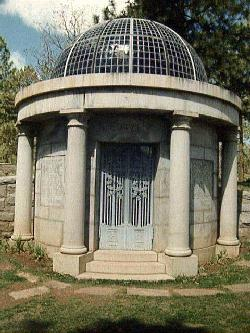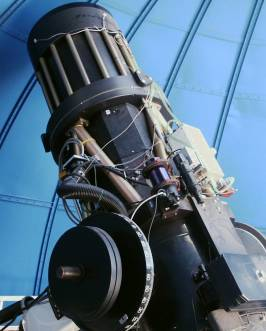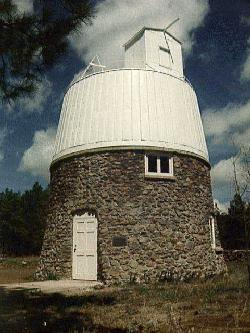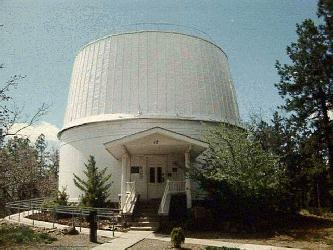Introduction
The space contains various wonders objects with significant effects on the study of astronomy. A wide range of research is commonly conducted in space to establish and prove various theories that are aimed at explaining the origin and significance of these heavenly bodies. The space was largely unknown to many in the ancient times.
In fact, people thought that the sun goes around the earth, which they believed was stationary. These facts were trashed as more researchers made progress in observing space with the aid of a telescope, among others. The solar system has increasingly received much attention as to its origin and significance to a community that is continuously exploiting the airspace.
These researches cannot be achieved without the aid of advanced astronomical facilities. Among these is the Lowell Observatory, located in Arizona, in the United States. This facility has enabled astronomers to conduct major research on a wide range of astrophysical systems and the solar system. It has also been utilized to observe the space through its high resolution telescopes.
Other services that people enjoy in Lowell include widescreen multimedia shows, tour in the universe through space theatres, and beautiful sceneries, among others. This paper will explore the Lowell observatory, its establishment, functions, and significance to research in astronomy and the society at large (Ribokas 1).
The Lowell Observatory
The Lowell Observatory was founded in 1894 as an institution that serves researchers and also for public outreach. It is usually known as the people’s observatory, given its significance in the development of astrophysics and research. The Observatory is also credited with telescope viewing, tours of the universe as well as widescreen multimedia shows, among other services to the public.
The institution is a non-profit making organization and was founded by Percival Lowell. In addition, the institution is committed to providing excellence in research as well as outreach to the public. This is of great significance to the community and the development of astrophysical research (Ribokas 1).
History
The Lowell Observatory was instituted in 1894, in flagstaff, Arizona. The institution, which is based in United States, has enabled astronomers to conduct major research on a wide range of astrophysical systems and the solar system. It has also been utilized to observe the space through its high resolution telescopes. The space was largely unknown to many in the ancient times.
In fact, people thought that the sun goes around the earth, which they believed was stationary. These facts were trashed as more researchers made progress in observing space with the aid of telescopes, among other devices (Lowell 34).

Fig. 1: shows Percival Lowell’s mausoleum
Source: Lowell Observatory
Lowell Observatory was founded in 1894 as an institution that serves researchers and for public outreach. This was done by Percival Lowell, who founded the institution. The institution has a rich account of observations that have been conducted.
For instance, it contributed to discovery of many heavenly bodies, such as the planet, Pluto. It also predicted the discovery of the same planet. The observatory has undergone several improvements and technological developments to advance its functions. Its initial function was to aid in measuring solar irradiance variability.
However, this changed when Harold Johnson assumed the Observatory in 1952. Instead it focused on studying light reflecting off Neptune and Uranus, from the sun. This led to the installation of its present 21-inch telescope. Furthermore, it was this period that led to more research on Neptune and Uranus.
Functions of the Lowell Observatory
Lowell Observatory has been influential in providing a renewing experience to the society. These include telescope viewing, tours of the universe as well as widescreen multimedia shows, among other services to the public, among others. The institution is therefore very instrumental in the society and works to provide resourceful services to the neighborhood as well as national and international researchers.
Moreover the center acts as a good facility for astronomical research and other relevant space research. In addition, it has been utilized to promote human understanding of the solar system. This is important as ancient understanding of solar system has changed over the years.
Myths that arose in the ancient times have been diffused to pave way for a better understanding based on provable and observable ideas and objects respectively in research and experiments. This has been achieved by the introduction of telescopes, and other devices such as the astrograph, LONEOS Schmidt and Clark telescopes, among others. The following figures illustrate the Lowell Observatory and some of its telescopes.

Fig. 1 LONEOS Schmidt telescope
Source: Lowell Observatory

Fig. 2 Pluto Telescope
Source: Lowell Observatory

Fig. 3 Observatory Dome of Clark telescope
Source: Lowell Observatory
The facility currently posses over 11 telescopes, five of which are used Mars Hill. In addition, two of the five are available for use by the public. Six telescopes are also used mainly for scientific observation in the institution’s dark-sky site, which is located in the southeast. The major functions of this institution may be categorized as stated below (Ribokas 1).
Research center
Lowell observatory offers a wide range of astronomical research facilities to the astronomers. Through its vast and advanced facilities, which include telescopes (that are space based), among others, astronomers are able to conduct their research on various astrophysical subjects as well as the solar system. Other areas of concern to astronomers are studies on the planets, formation of planets, forming of planets around stars and young stars.
Still others include studies on asteroids, which include surveys on those that exist near the earth’s surface (Ribokas 1). In addition, the studies Lowell institution supports include those centered on investigating Kuiper Belt which lies beyond the Neptune.
The facility also aids studies on variability of the sun, which are essential to meteorology and space technology. Lowell observatory is very important in facilitation investigations on formation of stars, building and customizing Instrumentations, which are utilized in telescopes. This sets the institution aside as a research center.
Educational center
The institution acts as an educational center as it brings knowledge through research and observation of some of the mysteries in space. In addition, it has been utilized to promote human understanding of the solar system. This is important as the ancient understanding of the solar system has changed over the years.
yths that arose in the ancient times have been dismissed through better research to provide for a better understanding based on observable research and experiments. This has been achieved by the introduction of telescopes, and other devices that have been instrumental in promoting knowledge on space and astronomy (Lowell Observatory 1).
These researches cannot be achieved without the aid advanced astronomical facilities, such as those in Lowell Observatory. These facilities have enabled astronomers to conduct major research on a wide range of astrophysical systems and the solar system. It as also been utilized to observe space through its high resolution telescope.
This has also aided astronomers to conduct their research on various astrophysical subjects as well as the solar system and thus promote it as an educational center. These have included studies on planets, their formation, forming of planets around stars and young stars, asteroids, among others (Ribokas 1).
In addition, the studies that Lowell institution supports include those focused on investigating Kuiper Belt, which lies beyond the Neptune. The facility also aids studies on variability of the sun, which are essential to meteorology and space technology. Lowell observatory is therefore very important in facilitating investigations on formation of stars, building and customizing Instrumentations, which are utilized in the telescopes.
Tourist site
The institution also acts as a tourist attraction center, given the services it offers and its unique location in the country. The dark skies provide good sceneries for tourist and this helps them to discover wonders of the solar system.
Furthermore, some of the tourists who visit Lowell center usually come to learn about skies and its inclusions. The location of this institution also makes it unique as it lies on the high mountains that provide fresh air, which is renewing to observers. Objects usually viewed near-earth asteroids, meteorites and other heavenly bodies that make up the solar system (Strauss 23).
Recreational center
Over 700000 people visit the center yearly, some of which come for recreation purposes. This is because, as much as space is a mystery, it is also exiting to watch. Other recreational activities include tours of the space through 3D theatres and views of multimedia shows that are broadcasted in widescreen high definition devices.
All these provide exciting site for both children and adults in their quest to understand their world (Ribokas 1). In essence, the facility provides an exclusive site for recreational activities and explorers who are increasingly visiting the institution.
Significance of the Lowell Observatory
The Lowell Observatory has been important since it aids scientific discoveries and research in the United States and other parts of the world, with regards to astronomy and space. Through its vast and advanced facilities, which include telescopes (that are space based), among others. Astronomers are able to conduct their research on various astrophysical subjects as well as the solar system.
Other areas of concern to astronomers are studies on the planets, formation of planets, forming of planets around stars and young stars. In addition, it has been utilized to promote the human understanding of the solar system. This is important as the ancient understanding of the solar system has changed over the years (Bowell 1).
Astronomers are able to conduct their research on various astrophysical subjects as well as the solar system. Other areas of concern to astronomers are studies on the planets, formation of planets, forming of planets around stars and young stars. Still others include studies on asteroids, which include surveys on those that exist near the earth’s surface (Ribokas 1).
In addition, the studies the Lowell institution supports include those centered on investigating Kuiper Belt which lies beyond the Neptune. The facility also aids studies on variability of the sun, which are essential to meteorology and space technology. Lowell observatory is very important in facilitation investigations on formation of stars, building and customizing Instrumentations, which are utilized in the telescopes.
The institution acts as a tourist site as has been mentioned above. Several people visit the center for recreation purposes over the years. This is because, as much as space is a mystery, it is very exiting to watch. Other recreational activities include tours of the space through 3D theatres and views of multimedia shows that are broadcasted in widescreen high definition devices.
All these inclusions are important in establishing the institution as a center for excellence in research and outreach to the public. It is also important to note that the institution acts as a tourist attraction center, since it offers great sceneries and observations through the telescope. In addition, its unique location serves it best in attracting more visitors. For instance, the dark skies provide good sceneries for tourist and this helps them to discover the mysteries of the solar system.
Conclusion
The Lowell Observatory has been influential in aiding scientific discoveries and research in the United States and other parts of the world, with regards to astronomy and space. In addition, it has been utilized to promote the human understanding of the solar system. This is important as the ancient understanding of the solar system has changed over the years.
Myths that arose in the ancient times have been diffused to pave way for a better understanding based on observable research and experiments. This has been achieved by the introduction of telescopes, and other devices that have been instrumental in promoting knowledge on space and astronomy (Lowell Observatory 1).
These researches cannot be achieved without the aid advanced astronomical facilities. Among these is the Lowell Observatory, located in Arizona, in the United States. This facility has enabled astronomers to conduct major research on a wide range of astrophysical systems and the solar system. It as also been utilized to observe the space through its high resolution telescope.
Astronomers are able to conduct their research on various astrophysical subjects as well as the solar system. Other areas of concern to astronomers are studies on the planets, formation of planets, forming of planets around stars and young stars. Still others include studies on asteroids, which include surveys on those that exist near the earth’s surface (Ribokas 1).
In addition, the studies the Lowell institution supports include those centered on investigating Kuiper Belt which lies beyond the Neptune. The facility also aids studies on variability of the sun, which are essential to meteorology and space technology. Lowell observatory is therefore very essential in facilitating investigations on formation of stars, building and customizing Instrumentations, which are used for telescopes.
Works Cited
Bowell, Edward. “The Lowell Observatory Near-Earth-Object Search (LONEOS): Ten years of asteroid and comet discovery”. What’s Happening Magazine, Space. Web.
Lowell Observatory. “Lowell Observatory: Daily events”. Lowell.edu. Web.
Lowell Observatory. “Lowell Observatory: The Discovery Channel telescope”. Lowell.edu. Web.
Lowell Observatory. “Lowell Observatory: The people’s Observatory”. Lowell.edu. Web.
Lowell, William. “The Explorers of Mars Hill: A Centennial History of Lowell Observatory, 1894-1994”. New Hampshire: Phoenix Publishing, 1994.
Ribokas, Bob. “Lowell Observatory – Flagstaff, Arizona”. Grand Canyon Explorer. Web.
Strauss, David. “Percival Lowell: The Culture and Science of a Boston Brahmin”. Cambridge: Harvard University Press, 2001.